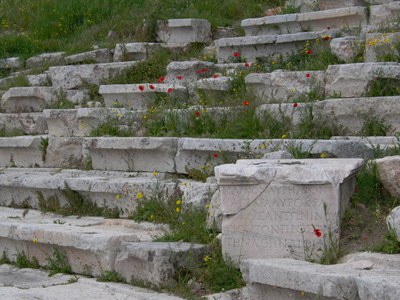Greek at our institute
We cordially invite all who have decided to study Ancient Greek, as well as those who are considering doing so, to our institute at the Humboldt University!

A modern discipline which has a long tradition
Greek has been taught here at Unter den Linden since 1810, and a lot has happened since then: today, we represent one of the most attractive destinations in the German-speaking world for the study of Greek Philology. The results of routine teaching evaluations show that students feel they are in excellent hands here and are very satisfied with the quality of instruction. There are good reasons for this: our institute is made up of a team of internationally renowned experts who offer a particularly wide range of content and methods in comparison with other German programmes. In this way, students have the opportunity to experience all the possibilities that the subject offers.
A thorough training in the language
First of all, we attach great importance to a thorough training in the language, which leads from an intensive Graecum course via tiered grammatical and linguistic tutorials in the BA programme to in-depth courses in the MA programme. The aim is not grammar per se, but rather facility in reading analytically and autonomously.
Main Focus - Literature in connection with cultural history
The main focus of the degree programme, however, is on literature: we treat the canonical texts, e.g. Homer, Plato, or Sophocles, with the intensity they deserve, but we also always endeavour to engage with the entire spectrum of Greek literature from the archaic period to late antiquity whilst considering important cultural-historical aspects and questions. Ancient medicine, for example, plays a major role at the Institute, and Christian texts are increasingly being offered.
Practice oriented education - Editing of texts und Palaeography
A highlight of our programme are seminars in which the editing of texts and the reading of medieval manuscripts (palaeography) are taught and practised. Right next door to our Institute is the Berlin State Library, where original manuscripts can be consulted.
Co-operations
Co-operations with the Papyrus Collection of the Egyptian Museum and the Berlin-Brandenburg Academy of Sciences and Humanities offer our students the opportunity to attend courses on papyri and inscriptions (epigraphy) with recognised specialists. A further advantage of our institute is our subject-specific didactics for students attaining a teaching degree, in which they learn about and research how to teach the subject in schools. This part of our programme in particular benefits students through its diverse connections with schools in Berlin.
Greek Philology in the Faculty of Language, Literature and Humanities
Our Greek Studies Programme is firmly embedded in the Faculty of Language, Literature and Humanities, especially through participation in the European Literatures degree programme. This interdisciplinary arrangement keeps the various histories of transformation and impact that ancient literature has had constantly in view. Translation theory and practice are likewise an integral part of the programme. Berlin's rich theatre and museum landscape invites students to explore connections between their studies and the wider world(s) of arts and letters.
Research Activities
The members of our team are involved in a wide range of research activities, which has a mutually beneficial effect on their course instruction: here, the ancient sciences, especially medicine, take centre stage. Various research projects at the institute deal with the survival of Greek texts in the Syrian and Arabic tradition (Graeco-Arabic studies). In connection with this, a reading group with students was established a few years ago, in which Greek texts are compared with their Syrian and Arabic translations.
Exchange
The institute cultivates close relationships with other mutually relevant institutes at Humboldt University, especially the Philosophy Department. We also maintain a lively exchange with colleagues at the Freie Universität and with numerous academic research institutions in Berlin, such as the Max Planck Institute for the History of Science, the Charité Museum of Medical History and the Berlin-Brandenburg Academy of Sciences and Humanities with its many major projects. We have an excellent international network: there are many collaborations, e.g. with Princeton, Oxford, Cambridge; colleagues from abroad spend research stays of various lengths with us; and many international students come to us via Erasmus programmes.
Briefly, we delight in working on all aspects of our field: its contents, its form and, above all, its future. We would be delighted for you to join us!
